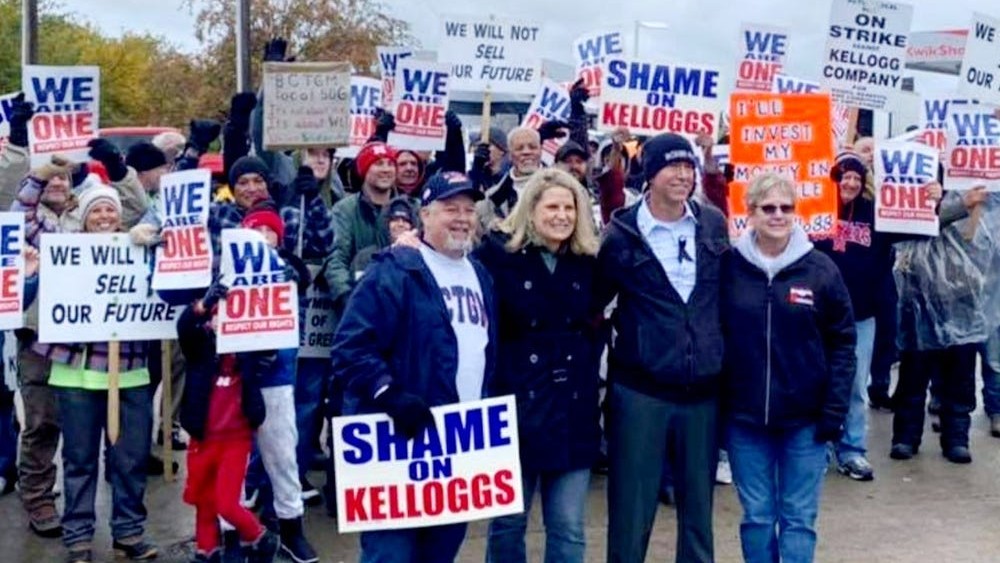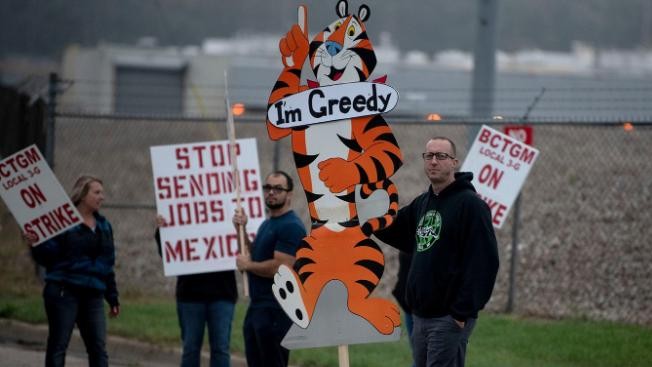
“We are very disappointed that [the agreement] was ultimately rejected. Because we have an obligation to our customers and consumers to continue to provide the cereals that they know and love …we are hiring permanent replacement employees in positions vacated by striking workers, as is permitted by law.”
If you replace the word “cereals” in that quote with “shows” – or simply spell it “serials” – it becomes an interesting contemplative exercise for Hollywood workers. Not yet a practical one – not yet. Replacement workers aren’t filing into soundstages, and there’s still a long “wait and see” in terms of how far automation and AI will take us, in terms of replicating work that still relies on “intangibles,” like the ability to light or design a set, speak lines, or even write them (columns like this perhaps included) in a (hopefully) compelling way.

As it is, that lead quote comes from Kris Bahner, a spokesperson for the Kellogg’s corporation. She was talking to NPR, in a story about the spamming of the cereal-and-snack giant’s job application portal, after they’d announced that they were absolutely, positively, going to replace their union folks with permanent “replacement workers.”
Even President Biden, who usually tries to minimize the disruptiveness of his Tweets, compared to certain predecessors, posted that “permanently replacing striking workers is an existential attack on the union and its members’ jobs and livelihoods. I strongly support legislation that would ban that practice.”
Of course, no such legislation will be getting through the Senate, as presently constituted, so, presumably that existential threat remains. Though it does raise questions about unionized labor – even in a moment like this that appears to favor workers (seemingly in short supply) over owners (who usually prefer to keep raises and benefits in short supply) – and to what degree strikes can be deemed “successful.”
Obviously, if Kellogg does replace its workers, it could be an “Air Traffic Controllers moment” for the Bakery, Confectionery, Tobacco Workers and Grain Millers International Union, certainly weakening them for future confrontations.
And of course, one would assume that most unionized film and TV workplaces would naturally be boycotting Kellogg products – in commissaries and on craft service tables everywhere – until things are resolved with the striking workers.
Though in an entangled world like ours, it’s interesting to consider that this kind of conceptual solidarity hasn’t extended to Amazon workers, for instance, trying to unionize their warehouses – something they’ll be trying once again, at least in Alabama, after an NLRB ruling found that “‘flagrant disregard’ of the rules for conducting a vote. ‘made a free and fair election impossible.’” Perhaps then, if warehouse workers did actually unionize, and join the AFL-CIO, it might make a “mutual support” equation with other industries a bit more… compelling?
(On which note, condolences to everyone grieving the lost lives in the recent outburst of tornadoes that tore through the Midwest and South. Victims included workers in a collapsed Amazon warehouse in Illinois, whose deaths prompted an outcry about the company’s reinstated cell phone ban in warehouses, depriving workers of a way to both get timely weather updates, or other news, or even to communicate should they find themselves otherwise incapacitated.)

But the notion of which strikes, stoppages, and walkouts are deemed “successful,” and which aren’t, also speaks to who is doing the walking out. When professional athletes do it, the most successful of whom each becomes their own individual “brand,” much like the most bankable stars (though there can still be a palpable distinction between that and acting talent), ownership eventually will need to settle – the billionaires will have to accommodate the millionaires, in those instances.
And so, too, with many below-the-line film workers, at least for now, with those aforementioned “intangibles” that separate great work from the merely good, and good, from everything else.
As the consulting group/think tank combo The Decision Lab says in the rather optimistically-titled essay, Why Machines Will Not Replace Us, “as AI and robots emerge, our expertise, problem-solving, judgement and creativity are more important than ever.”
Conversely, a much less optimistic Newsweek piece from 2018 says “robots need not be perfect, only equal to—or a tad better than—complicated and expensive humans. And technologists are working hard to make sure they are a tad better.”
The Decision Lab concludes that “human resistance is not futile” – which is doubtless why we’re seeing an uptick in labor activism (and, as noted previously, people simply walking away from stultifying work). And none of this is to say that one kind of worker is more inherently valuable than another. But it is to say that when those who own the means of production are negotiating with those who do the producing (“producing” as in actual labor, not the “adding your cousin’s name to the credits” sense), and the more they perceive that labor as representing unique skills, the more they’re willing to actually sit down and talk. And maybe even listen.
In other words, the harder you are to replace, the more successful your strike is likely to be.
Film and TV workers, above and below-the-line, have benefitted from this perception, whereas other workers have not. Whether those in the latter group can withhold their labor long enough – as craftworkers merely threatened to do – to make a difference in how they’re responded to, remains to be seen.
Though included on the long list of intangibles would be the degree of support one group of workers gets from all the others.
Even those working in putatively glamorous industries.
 Mark London Williams is a BTL alum who currently covers Hollywood, its contents and discontents, in his recurring “Across the Pond” dispatch for British Cinematographer magazine, contributes to other showbiz and production-minded sites, and musters out the occasional zombie, pandemic-themed, or demon-tinged book and script, causing an increased blurring in terms of what still feels like “fiction.”
Mark London Williams is a BTL alum who currently covers Hollywood, its contents and discontents, in his recurring “Across the Pond” dispatch for British Cinematographer magazine, contributes to other showbiz and production-minded sites, and musters out the occasional zombie, pandemic-themed, or demon-tinged book and script, causing an increased blurring in terms of what still feels like “fiction.”
Mark London Williams’ Union Roundup column will appear every Tuesday. You can reach him to give him tips and feedback at [email protected]. He can also be found on Twitter @TricksterInk. Mark’s past columns can be found here and here.
Note: As mentioned at the top, Mark will be taking off next week, Tuesday, Nov. 3o, but we might have a guest columnist.
All photos courtesy of the respective copyright holders.





